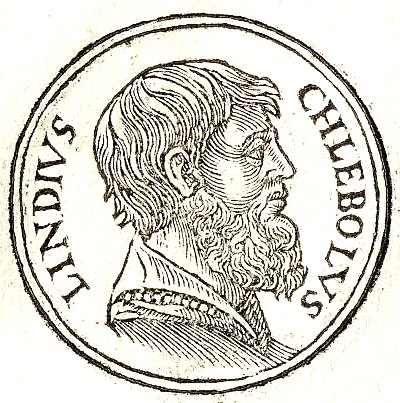Cleobulus on:
[Wikipedia]
[Google]
[Amazon]
 Cleobulus (; , ''Kleoboulos ho Lindios''; fl. 6th century BC) was a Greek poet and a native of Lindos. He is one of the Seven Sages of Greece.
Cleobulus (; , ''Kleoboulos ho Lindios''; fl. 6th century BC) was a Greek poet and a native of Lindos. He is one of the Seven Sages of Greece.
I am a brazen maiden lying here
Upon the tomb of Midas. And as long
As water flows, as trees are green with leaves,
As the sun shines and eke the silver moon,
As long as rivers flow, and billows roar,
So long will I upon this much wept tomb,
Tell passers by, "Midas lies buried here."
The
Cleobulus Epitaph and Riddle
{{Authority control Ancient Rhodian poets 6th-century BC Greek poets Seven Sages of Greece Epigrammatists of the Greek Anthology
 Cleobulus (; , ''Kleoboulos ho Lindios''; fl. 6th century BC) was a Greek poet and a native of Lindos. He is one of the Seven Sages of Greece.
Cleobulus (; , ''Kleoboulos ho Lindios''; fl. 6th century BC) was a Greek poet and a native of Lindos. He is one of the Seven Sages of Greece.
Life
Cleobulus was the son of Evagoras and a citizen of Lindus in Rhodes.Clement of Alexandria
Titus Flavius Clemens, also known as Clement of Alexandria (; – ), was a Christian theology, Christian theologian and philosopher who taught at the Catechetical School of Alexandria. Among his pupils were Origen and Alexander of Jerusalem. A ...
called Cleobulus king of the Lindians, and Plutarch
Plutarch (; , ''Ploútarchos'', ; – 120s) was a Greek Middle Platonist philosopher, historian, biographer, essayist, and priest at the Temple of Apollo (Delphi), Temple of Apollo in Delphi. He is known primarily for his ''Parallel Lives'', ...
spoke of him as the tyrant. The letter quoted by Diogenes Laërtius
Diogenes Laërtius ( ; , ; ) was a biographer of the Greek philosophers. Little is definitively known about his life, but his surviving book ''Lives and Opinions of Eminent Philosophers'' is a principal source for the history of ancient Greek ph ...
, in which Cleobulus invites Solon to Lindus as a democratic place of refuge from the tyrant Peisistratus in Athens
Athens ( ) is the Capital city, capital and List of cities and towns in Greece, largest city of Greece. A significant coastal urban area in the Mediterranean, Athens is also the capital of the Attica (region), Attica region and is the southe ...
, is undoubtedly a later forgery. Cleobulus is also said to have studied philosophy in Egypt
Egypt ( , ), officially the Arab Republic of Egypt, is a country spanning the Northeast Africa, northeast corner of Africa and Western Asia, southwest corner of Asia via the Sinai Peninsula. It is bordered by the Mediterranean Sea to northe ...
.Diogenes Laërtius, i. 89 He had a daughter, Cleobulina, who found fame as a poet, composing riddles in hexameter verse. Cleobulus is said to have lived to the age of seventy, and to have been greatly distinguished for strength and beauty of person.
Extant fragments
Cleobulus apparently wrote lyric poems, as well as riddles in verse. Diogenes Laërtius also ascribes to him the inscription on the tomb ofMidas
Midas (; ) was a king of Phrygia with whom many myths became associated, as well as two later members of the Phrygian royal house.
His father was Gordias, and his mother was Cybele. The most famous King Midas is popularly remembered in Greek m ...
, of which Homer
Homer (; , ; possibly born ) was an Ancient Greece, Ancient Greek poet who is credited as the author of the ''Iliad'' and the ''Odyssey'', two epic poems that are foundational works of ancient Greek literature. Despite doubts about his autho ...
was considered by others to have been the author:
Suda
The ''Suda'' or ''Souda'' (; ; ) is a large 10th-century Byzantine Empire, Byzantine encyclopedia of the History of the Mediterranean region, ancient Mediterranean world, formerly attributed to an author called Soudas () or Souidas (). It is an ...
mentions him, and farther down, his daughter Cleobulina. An epigram of his is in the Palatine Anthology (VII, 153), and in another place records two epigrams together as "One of Homer, or of Cleobulus", without specifying which is the latter's. French scholar Pierre Waltz analyzed the problem in the ''Anthologie Grecque'' Likewise an enigma is attributed to him is recorded in the Palatine Anthology (XIV).
Many sayings were attributed to Cleobulus:
*"Ignorance and talkativeness bear the chief sway among men."
*"Cherish not a thought."
*"Do not be fickle, or ungrateful."
*"Be fond of hearing rather than of talking."
*"Be fond of learning rather than unwilling to learn."
*"Seek virtue and eschew vice."
*"Be superior to pleasure."
*"Instruct one's children."
*"Be ready for reconciliation after quarrels."
*"Avoid injustice."
*"Do nothing by force."
*"Moderation is the best thing."
Legacy
There is a stonetumulus
A tumulus (: tumuli) is a mound of Soil, earth and Rock (geology), stones raised over a grave or graves. Tumuli are also known as barrows, burial mounds, mounds, howes, or in Siberia and Central Asia as ''kurgans'', and may be found through ...
on the northern headland of Lindos bay, which is sometimes called the "Tomb of Cleobulus".Lucile Brockway, George P. Brockway, (1966), ''Greece: a classical tour with extras'', page 220. Knopf
An asteroid
An asteroid is a minor planet—an object larger than a meteoroid that is neither a planet nor an identified comet—that orbits within the Solar System#Inner Solar System, inner Solar System or is co-orbital with Jupiter (Trojan asteroids). As ...
, 4503 Cleobulus, discovered in 1989, is named for him.References
Sources
*External links
*Cleobulus Epitaph and Riddle
{{Authority control Ancient Rhodian poets 6th-century BC Greek poets Seven Sages of Greece Epigrammatists of the Greek Anthology